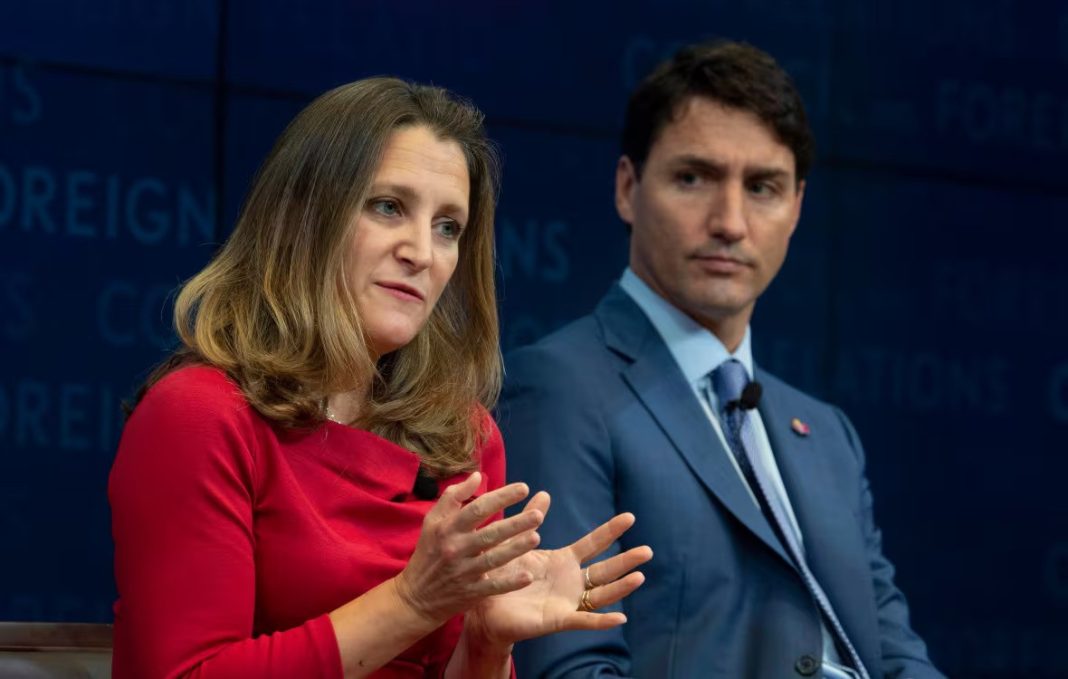Freeland’s resignation marks the first major dissent within Trudeau’s cabinet amid rising tensions over U.S. tariffs and economic policies.
December 17, 2024: Ottawa: In a shocking political development, Canada’s Deputy Prime Minister Chrystia Freeland resigned on Monday, citing deep disagreements with Prime Minister Justin Trudeau over economic strategy and U.S. tariff threats. Freeland, who also stepped down as finance minister, is the first senior cabinet member to publicly break ranks with Trudeau, raising questions about his leadership and threatening his already weakened hold on power.
Key Details of Freeland’s Resignation:
- Rift Over Tariffs: Freeland pointed to U.S. President-elect Donald Trump’s proposed 25% tariffs on Canadian imports as a “grave challenge” for the country. “For weeks, you and I have found ourselves at odds about the best path forward for Canada,” she wrote in her resignation letter, stressing the need to take these threats “extremely seriously.”
- Leadership Disagreement: Trudeau reportedly wanted to shuffle Freeland to another cabinet role. Freeland rejected the move, stating, “I have concluded that the only honest and viable path is for me to resign from the cabinet.”
- Economic Policy Dispute: Freeland appeared to criticize Trudeau’s recent sales tax holiday, describing it as a “costly political gimmick” and advocating for a more cautious fiscal approach to safeguard Canada’s economy amid tariff risks.
- Trudeau’s Waning Support: Freeland’s departure adds fuel to Trudeau’s political struggles. Polls currently show Trudeau’s Liberal Party trailing the Conservatives, led by Pierre Poilievre, by nearly 20 points. Poilievre’s deputy leader, Andrew Scheer, seized on the resignation, calling it evidence that “even she has lost confidence in Trudeau.”
- Freeland’s Legacy: A former journalist, Freeland joined Trudeau’s cabinet in 2015 and played a crucial role in negotiating major trade deals, including agreements with the U.S. and European Union. She has been a key figure in managing Canada’s response to economic challenges under Trump.
- Cabinet Fallout: Housing Minister Sean Fraser also announced his exit from politics the same day, amplifying concerns about disarray within Trudeau’s team. Another senior cabinet member, Anita Anand, expressed shock at Freeland’s resignation, calling it “really hard news to take.”
- What’s Next: Freeland confirmed her intention to run in the next election, expected in 2025, but her departure raises doubts about Trudeau’s ability to unite his party and navigate Canada through economic uncertainty.
Political Fallout and Future Outlook:
Experts view Freeland’s resignation as a severe blow to Trudeau’s leadership. Lori Turnbull, a political scientist at Dalhousie University, called it a “total disaster,” underscoring a “crisis of confidence” within Trudeau’s government. Similarly, University of Ottawa professor Genevieve Tellier noted that Freeland’s departure signals internal fractures that the opposition will exploit.
Also Read: Pakistan’s Debt Surges by PKR 4.3 Trillion Amid Escalating Economic Crisis
As Canada braces for potential economic fallout from U.S. tariffs, Trudeau now faces mounting challenges to hold his cabinet together and regain public trust.
Tags: Chrystia Freeland resignation, Justin Trudeau leadership crisis, Canada political turmoil, U.S. tariffs on Canada, Liberal Party dissent, Pierre Poilievre opposition, Canadian economy, Canadian cabinet shakeup.

